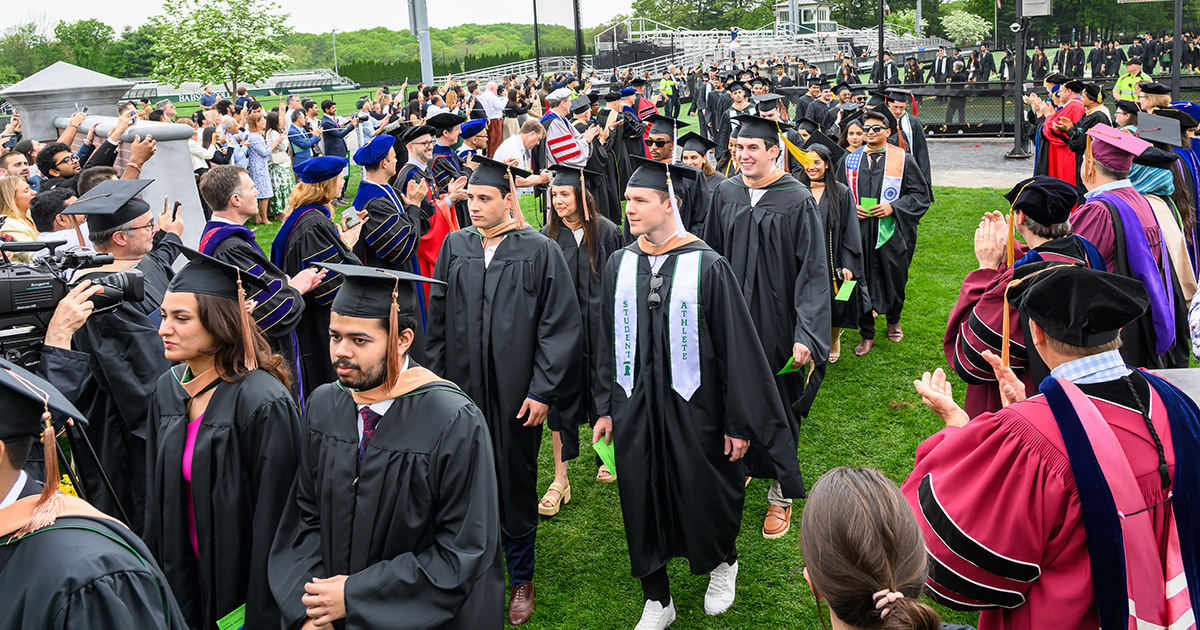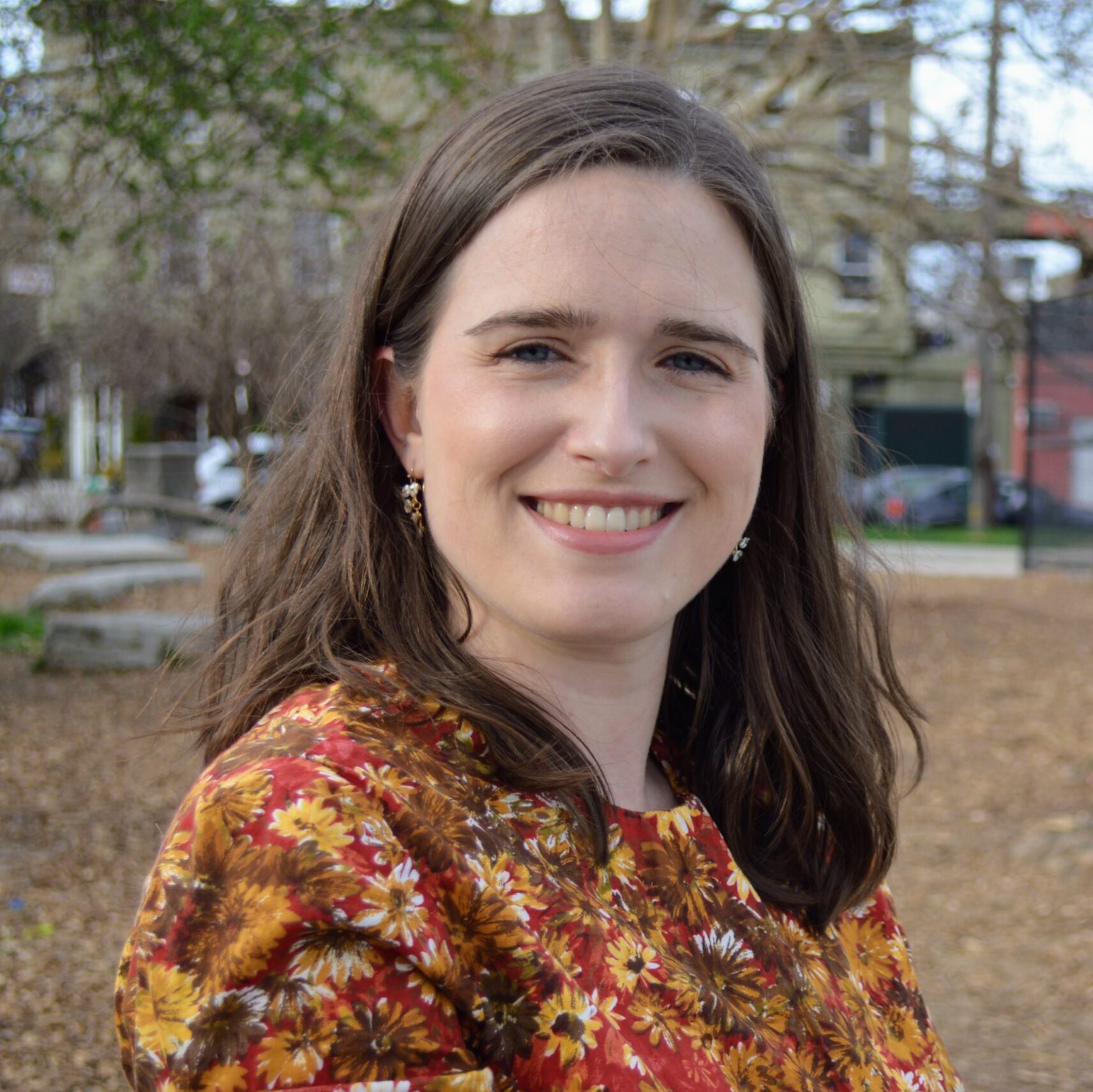The Enduring Power of eTower
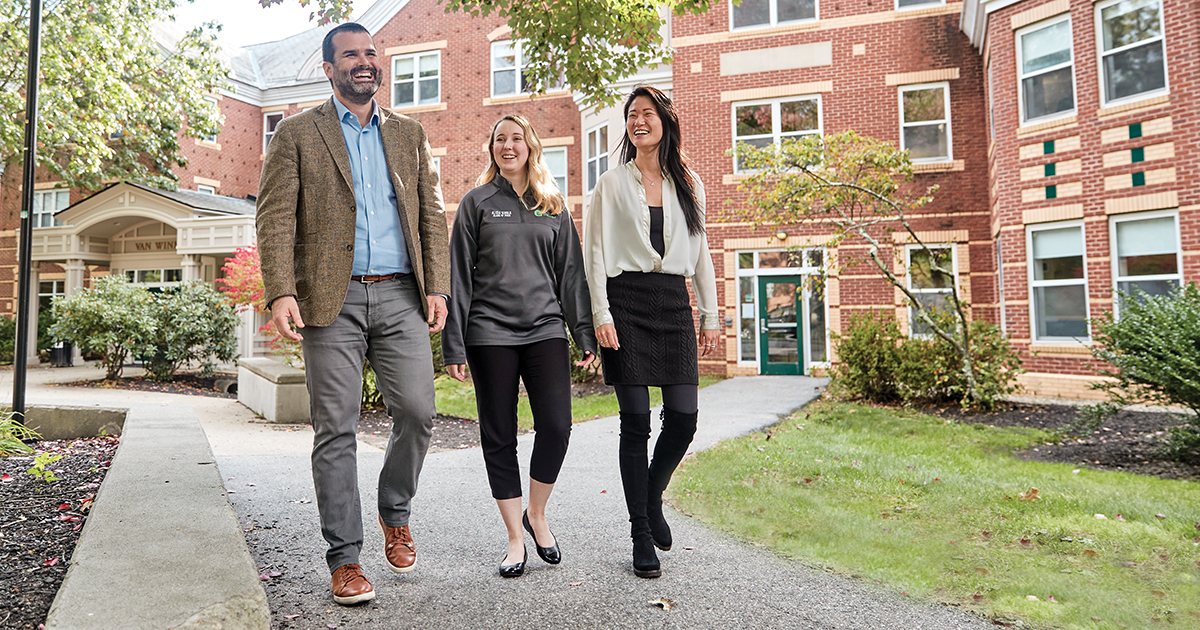
Alicia Sibole ’23 was homeless in high school.
Her parents had divorced when she was in ninth grade, and her mother struggled with mental illness and was unemployed. So, for a year and a half, the teenager from Tucson, Arizona, shared an air mattress with her mom in a “roach-infested bedroom” at a relative’s house. “It was crazy,” she says. “We had nothing.”
What Sibole did have was a burning entrepreneurial spirit, unique organizational skills, and a burgeoning business. She started what would become Alicia’s Life Tips in seventh grade, creating and selling pencil boxes with stationery and weekly tips on organization and time management, then eventually customizable planners.
“Entrepreneurship was the thing that I grasped on to,” Sibole says. “Honestly, it was a coping mechanism. It was survival for me at that time.”
The light at the end of the tunnel, she says, was pursuing her passion for entrepreneurship in college, far from the troubles of home. Sibole discovered Babson (2,600 miles away) and ultimately eTower—the College’s living and learning community for entrepreneurs.
“They understood my story, and they wanted me to be a part of eTower’s story,” Sibole says. “That was where I really found my family; that’s where I found my home. I truly mean that, because I had no family, I had no home. eTower became my home.”
Now, Sibole is the president of eTower, carrying on a legacy that began 20 years ago.
The Idea
It was early 2001, and Babson sophomore Andrew Foley ’03 had an idea: What if we could create a community of entrepreneurs—a live-in incubator for students growing businesses?
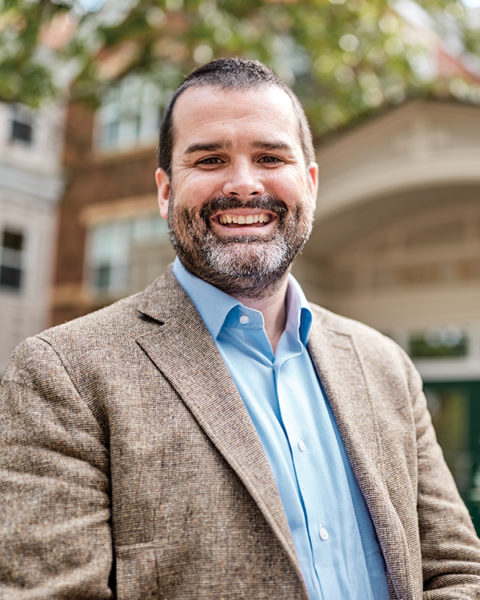
Andrew Foley ’03 first conceived and helped create the College’s first living-learning community for student entrepreneurs (Photo: Michael Quiet)
“It was clear that there was a place for it in the ecosystem of all the things that Babson does to accelerate entrepreneurship,” Foley says.
Foley began rounding up support and possible fellow residents, including Richard Futrell ’04. “We were just solving a problem. There was no space for kids living on campus to run businesses,” Futrell says. “Entrepreneurs need to live together, need to work together, and we started this incubator.”
With the support of the College—including President Stephen Spinelli Jr. MBA’92, PhD, then the director of The Arthur M. Blank Center for Entrepreneurship—the fledgling group secured approval and space on the second floor of Van Winkle Hall as the first living-learning community on campus.
In summer 2001, the first group of 21 eTower residents moved in. They replaced the teal carpet and pink and purple furniture, and they repainted the pink walls in business colors: Babson green, Home Depot orange, and Dunkin’ Donuts purple. “We quickly made it a home,” Foley says. “It was us; it was eTower.”
“It was clear that there was a place for it in the ecosystem of all the things that Babson does to accelerate entrepreneurship.”
Andrew Foley ’03
The Launch
At eTower, the writing has always been on the walls.
In its second year, eTower’s eager entrepreneurs would cover the walls with giant rolls of sticky paper during brainstorming sessions. It was productive but not efficient. So, Foley had another idea: Let’s repaint the walls with dry-erase paint. The problem was no product existed. In a living community of emerging entrepreneurs, that’s no problem; that’s an opportunity.
First-year student John Goscha ’06—“the most pure inventor I’ve ever met,” Foley says—quickly set up a makeshift lab in his eTower room, where he and roommate Will Gioielli ’06 began mixing paints and chemicals. Soon, they tested a formula and painted a wall. “It wasn’t what it is today, but it worked,” Foley says. “It was miraculous.”
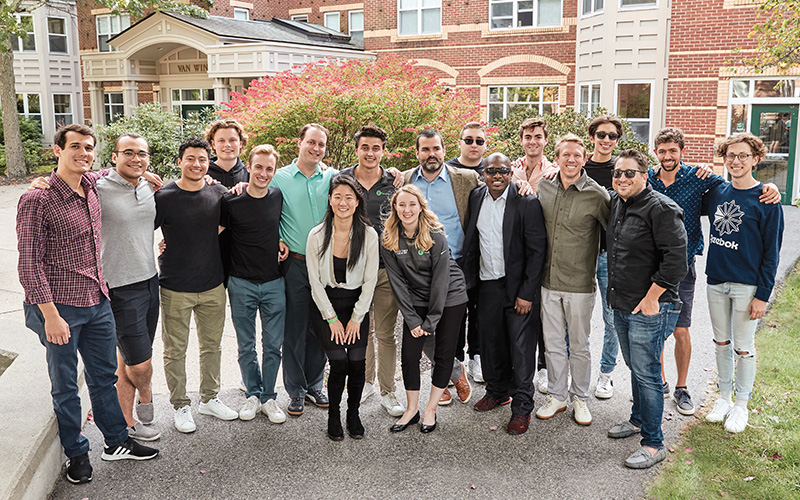
A group of eTower alumni and residents congregate outside Van Winkle Hall during Back to Babson weekend, when eTower celebrated its 20th anniversary with a gala. (Photo: Michael Quiet)
The nearly noxious smell didn’t deter other students and faculty from writing on the wall, asking to order the paint. Foley began creating a business plan and came up with a name: IdeaPaint. It took years for Goscha—along with co-founder and eTower alumnus Jeff Avallon ’06—to perfect the product and formally launch the company, but its roots were firmly planted in eTower.
“What was so great about it was that it was a business and a product that embodied exactly what eTower was all about,” says Michael Mandel ’05, who joined the inaugural class as a first-year student and lived all eight semesters in eTower.
After graduation, Foley worked full time on IdeaPaint for a couple of years before moving into real estate development, leaving eTower in the care of a second wave of resident entrepreneurs.
“We knew it was a good idea, and we knew that there was a place for it,” Foley says. “We didn’t know if it was going to last. Student organizations are a relay race. It requires consistent leadership to hand off year after year, to reinvent and elevate it. Any one year, or string of years, it could fall by the wayside.”
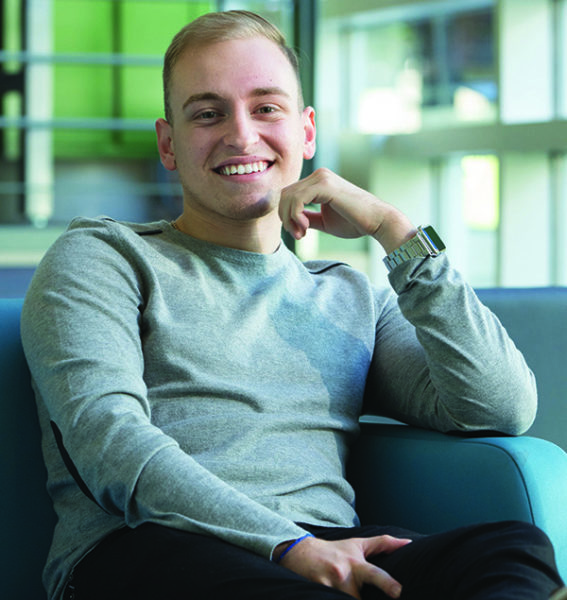 Resident Shark
Resident Shark
David Zamarin ’19 proved that eTower residents can successfully swim with sharks. In 2018, as a Babson student, Zamarin appeared on ABC’s “Shark Tank” to pitch his company, DetraPel, a nontoxic spray to protect fabric and repel liquid-based substances. Zamarin received offers from four of five sharks and landed a deal with Mark Cuban and Lori Greiner.
The Pivot
After about a decade, though, the eTower baton dropped.
Although eTower wasn’t designed only for students with startup ventures, the pressure to create and to compete grew and the environment changed. eTower became more exclusively geared toward startups, became more isolated on campus, and eventually lost its housing status.
“It was a real wakeup call,” Foley says, “that there has to always be this balance between community and creation.”
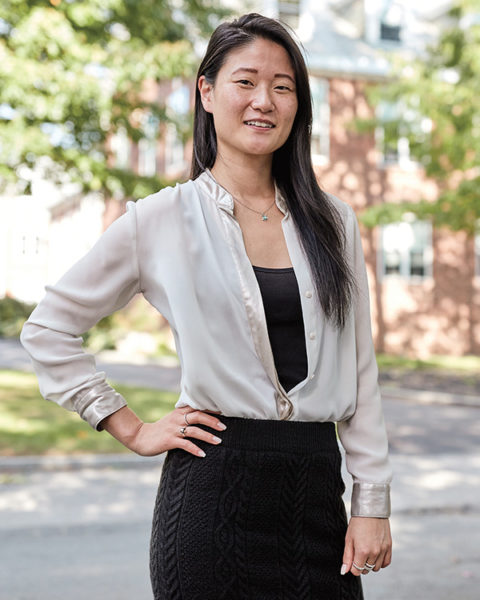
As president, Diana Yuan ’15 helped restore eTower’s status and sparked a renaissance for the community. (Photo: Michael Quiet)
More than anyone, Diana Yuan ’15 began to restore that balance. “It took a year, but we began to turn it around,” Yuan says. “It was a lot of community building, finding the right people, and improving the perception on campus.”
Under Yuan’s leadership, eTower returned to Van Winkle Hall after two semesters and quickly reconnected with the campus. The efforts paid off, and a year later, eTower earned the 2013–2014 Community of the Year Award from the College. Yuan—who co-founded Indico Data Solutions after her term as eTower president—ensured the relay would continue.
“We worked to reset the culture and keep the core aspects that made eTower special. We also wanted to make sure that we could pass it along to the next generation and allow them the flexibility to make it their own,” Yuan says. “Every year it’s been passed on, it’s just evolved and gotten bigger and better. I feel super-inspired by the younger generation.”
The leaders who followed—including presidents such as Ryan Laverty ’20, Sumukh Setty ’20, and Jason Shatsky ’21, all of whom now serve on eTower’s board of advisors, alongside Foley, Mandel, Yuan, Gautam Gupta ’07, and Chris Jacobs ’10—have made eTower integral to the Babson entrepreneurial ecosystem.
They opened eTower’s weekly Wednesday night speaker series to the public, attracting upward of 80 people to the community room. They powered ePitch—Babson’s biggest business competition with $100,000 in prize money—as part of the Centennial celebration in 2019, and they launched the Young Entrepreneurs Conference. And, eTower’s success has served as the inspiration for Babson’s new Entrepreneurial Leadership Village, a physical and virtual hub for aspiring and established entrepreneurial leaders.
As importantly, they have continued to fortify their own community. The eTower residents focus as much on supporting one another as they do building their ventures. Over the past 20 years, nearly 200 alumni have called eTower home.
“Unconditional love is a big thing at eTower,” says Jonathan DiModica ’21, who spent seven semesters at eTower. He singles out “hot seats,” in which residents share sometimes deeply personal issues they are facing in their ventures and their lives and receive overwhelming support. “That’s what showed me that this was a family, and this was an unbreakable bond.”
$112,178
The eTower alumni not only reunited at Back to Babson to celebrate its 20th anniversary, but the gala at Babson Commons also capped a major fundraising campaign, which included a matching donation from Babson Professor Leonard Green, a longtime eTower supporter. A collegial but competitive auction of naming rights for the resident rooms generated nearly half of the campaign’s fundraising total of $112,178.
The Future
The future of eTower will be determined by the same force that founded it. “eTower is driven by the student body. It’s up to the students to carry it forward,” Foley says. “The students that are there now are just, I mean, they’re rock stars.”
The torch now is in the hands of one of those star students, who shared part of her personal story with eTower alumni at its 20th anniversary gala during Back to Babson weekend in October.
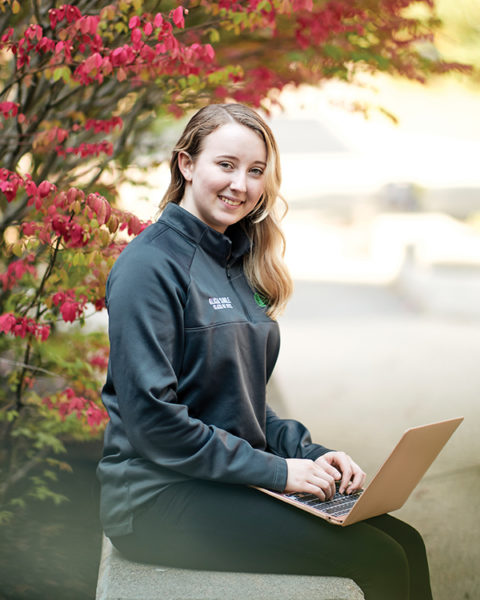
Alicia Sibole ’23, the current president, carries on the legacy of eTower that began 20 years ago. (Photo: Michael Quiet)
Sibole joined eTower in January 2020, less than two months before the pandemic forced her and all Babson students off campus. Because eTower was her literal home, she didn’t know where to go. She settled with her older sister in Virginia and threw herself into her work—not unlike how she handled the uncertainty of her home life in high school.
Sibole started as a paid intern with Calyx Containers, where eTower alumnus Anton Pronichenko ’17 was the operations manager. She embraced operations analytics and quickly advanced in the company, opting to take a leave of absence from Babson in fall 2020 to work full time as a strategic project manager. Harnessing her passion for organization and her entrepreneurial mindset, she made an immediate impact. The company offered her a raise, and a percentage of profits, to stay another semester.
But, eTower needed her, too. Back in March 2020, when the residents were saying their tearful goodbyes, Sibole had realized that she soon would be the only resident to experience eTower before the pandemic. So, she made a promise.
“I vowed to them that I would keep eTower great. Every day, I think about that promise,” Sibole says. “So, I literally turned down a potential six-figure job to be the president of eTower, and I don’t regret it one bit.”
Sibole returned to eTower. She returned home.
Posted in Community, Entrepreneurial Leadership




